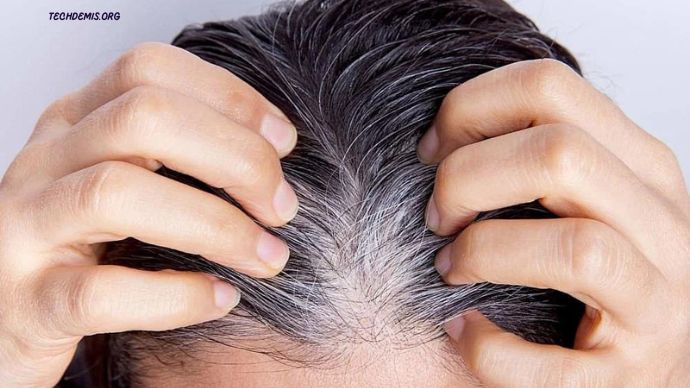White hair can be a natural part of aging, but it can also be a result of various factors such as genetics, lifestyle, and environmental influences. While some embrace their silver strands as a sign of wisdom, others may seek ways to prevent or delay the graying process. In this article, we’ll delve into the causes of white hair and explore simple and natural methods to keep your locks vibrant and youthful.
What Causes White Hair?
White hair can be caused by a variety of factors, both natural and environmental. One primary cause is the aging process. As we grow older, the cells in our hair follicles gradually produce less melanin, the pigment responsible for hair color. This decrease in melanin production leads to the hair losing its color and appearing white or gray.
Genetics also play a significant role in determining when and how a person’s hair will turn white. If your parents or grandparents experienced premature graying, there’s a higher chance that you may also experience it.
Other factors that can contribute to white hair include nutritional deficiencies, particularly in vitamins such as B12 and minerals like iron and copper. Stress is another common factor, as chronic stress can accelerate the aging process and lead to premature graying.
Additionally, lifestyle choices such as smoking have been linked to premature graying. The harmful chemicals in tobacco smoke can damage the hair follicles and disrupt melanin production, leading to premature aging of the hair.
Overall, the causes of white hair are multifaceted and can vary from person to person. Understanding these factors can help individuals take steps to maintain the health and vitality of their hair as they age.
Genetics
Genetics play a significant role in determining when and how your hair will turn white. If your parents or grandparents experienced premature graying, there’s a higher likelihood that you will too. The age at which you start to gray is largely predetermined by your genes.
Aging
As we age, the production of melanin, the pigment responsible for hair color, decreases. This decline in melanin leads to the gradual loss of color in our hair, resulting in gray or white strands.
Nutritional Deficiencies
A deficiency in certain vitamins and minerals, such as vitamin B12, iron, and copper, can contribute to premature graying. Ensuring a balanced diet rich in these nutrients can help maintain the health and vitality of your hair.
Stress
Chronic stress can accelerate the graying process by triggering the production of free radicals, which can damage hair follicles and disrupt melanin production. Finding effective stress management techniques, such as meditation or yoga, can help mitigate this effect.
Smoking
Studies have shown that smoking is associated with premature graying. The harmful chemicals present in tobacco smoke can impair blood flow to the hair follicles, leading to oxidative stress and premature aging of the hair.
The Role of Melanin
Melanin is the pigment responsible for determining the color of our hair, skin, and eyes. It is produced by specialized cells called melanocytes located in the hair follicles. There are two main types of melanin: eumelanin, which produces brown to black hair colors, and pheomelanin, which produces red and yellow hues. The ratio and distribution of these pigments determine our hair color. As we age, the activity of melanocytes decreases, leading to a decrease in melanin production and ultimately resulting in white or gray hair.
Natural Ways to Prevent White Hair
Healthy Diet
A balanced diet rich in vitamins, minerals, and antioxidants is essential for maintaining the health and vitality of your hair. Incorporate foods such as leafy greens, nuts, seeds, eggs, and fish, which are high in nutrients that support hair health.
Stress Management
Finding effective ways to manage stress is crucial for preventing premature graying. Engage in activities that promote relaxation and emotional well-being, such as exercise, meditation, or spending time in nature.
Scalp Massage
Regular scalp massage can stimulate blood flow to the hair follicles, promoting the delivery of nutrients and oxygen essential for healthy hair growth. Use gentle circular motions to massage your scalp daily, or consider incorporating essential oils such as rosemary or lavender for added benefits.
Herbal Remedies
Certain herbs and botanicals have been traditionally used to promote hair health and prevent premature graying. Consider incorporating herbs such as sage, nettle, or Indian gooseberry into your hair care routine through herbal teas, supplements, or topical applications.
Conclusion
While white hair is often a natural part of the aging process, understanding its causes and implementing simple lifestyle changes can help maintain the health and vibrancy of your locks. By adopting a healthy diet, managing stress effectively, and incorporating natural remedies into your hair care routine, you can embrace aging gracefully while keeping your hair looking radiant and youthful.
FAQs
Why does hair turn white with age?
Hair turns white with age due to a decrease in melanin production, the pigment responsible for hair color.
Can white hair be reversed naturally?
While it’s challenging to reverse white hair completely, adopting a healthy lifestyle and incorporating certain natural remedies may help slow down the graying process.
How does stress contribute to premature graying?
Chronic stress can trigger the production of free radicals, which can damage hair follicles and disrupt melanin production, leading to premature graying.
Are there any side effects to using herbal remedies for white hair?
While herbal remedies are generally safe, it’s essential to consult with a healthcare professional before using them, as some herbs may interact with medications or have side effects.
Can lifestyle changes prevent white hair?
Adopting a healthy lifestyle, including a balanced diet, stress management, and regular exercise, may help prevent or delay the onset of white hair.

